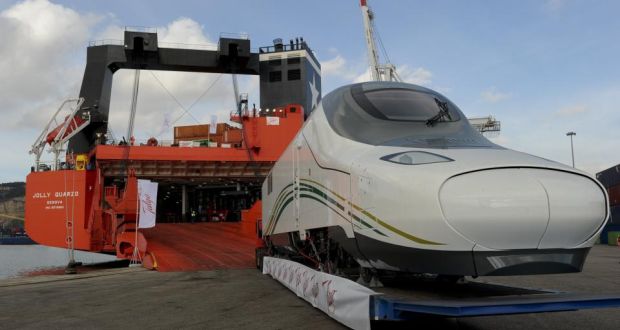Spanish high-speed rail fiasco in Saudi Arabia
Finishing the Medina-Mecca rail link proving to be very problematic for Spanish firms
Mon, Feb 9, 2015, 01:35
A unit of the new highspeed train built by Spanish manufacturer Talgo is loaded onto a freighter in Barcelona’s port bound for Jeddah City in Saudi Arabia. The Medina-Mecca rail link is plagued by delays, political tensions and technical headaches. Photograph: Josep Lago/AFP/Getty Images
It was meant to be a pioneering feat of engineering and an international showcase for Spain’s mastery of high-speed rail infrastructure. But
less than two years ahead of its scheduled inauguration, the Medina-Mecca rail link is
plagued by delays, political tensions and technical headaches.
The
Haramain High Speed rail system will carry up to half a million Muslim pilgrims each day a distance of 450km between the holy cities of Medina and Mecca in Saudi Arabia, at a speed of 300km/h. In
2011,
the Saudi government awarded the contract for the work to a consortium of 12 Spanish companies and two Saudi firms, with a budget of €6.7 billion. The deal also includes supplying 35 trains and operating the line for 12 years.
The leading firms in the consortium – Talgo, Renfe and Adif – have extensive experience with Spain’s own “AVE” high-speed network, the world’s second largest after China’s.
The Saudi project is the first such line to be built across a desert and the biggest contract Spanish companies have ever undertaken abroad.
Until recently, there was little to suggest that the route was facing difficulties. In early 2014, Spain’s public works minister, Ana Pastor, visited part of the work-in-progress and declared herself delighted with what she saw.
Future
“
The work is advancing and what’s more it’s doing so without any technical problems, with great Spanish professionals,” she said.
But
a year on, the
project’s future has been cast in doubt. Last autumn,
reports emerged that the Saudi government was unhappy at the speed at which it was advancing.
Then in December,
the new Saudi transport minister, Abdullah bin Abdulrahman al-Muqbel issued a
stern warning to the companies involved to ensure they meet the deadline for completion of December 2016.
After making a two-day inspection, the minister told contractors “to present an urgent plan to avoid delays within the next two months . . .
This is also considered a final warning either to commit and improve performance or face the consequences”.
While the 2016 deadline has not been moved, the Spanish-led consortium has expressed concern that delays by other contractors in the preliminary work on the line have squeezed the timetable and yet not been acknowledged by the Saudi government.
Abdullah bin Abdulrahman al-Muqbel only took office in early December and
his engineering background means he has a hands-on approach to the ministerial post. Spanish executives and technicians have also described him as
much more direct and plain-speaking than his colleagues.
But beyond the political problems lie substantial
technical challenges. The biggest of these is the fact that the rail line crosses the Arabian Desert, where sandstorms are frequent and large dunes can suddenly form.
“Construction of high-speed rail lines in
Spain has been done in a much more stringent geography than in many other countries,” says
Alejandro Lago, a professor at IESE Business School. “
But whenever a project is done in a new environment, like this one, there is always a steep learning curve.”
The consortium’s initial proposal included the
construction of a wall of up to five metres in height next to the 110km section that is most vulnerable to sand being blown onto the line.
Costly solution
However, having analysed the conditions more closely, technicians
instead decided to build the most exposed section of line on concrete, which is easier to clean sand off than the stones used under Spain’s AVE line.
Some parts of the route have also been raised on an embankment. This is a
more costly solution than previously planned and it creates further concerns, such as whether enough of the line has been elevated and if the
sand provides a solid enough base.
Technicians from Ineco, the consortium’s fourth-biggest investor, drew up a report a year ago suggesting a wall should also be built along the line, with a ditch to drain sand. However, those recommendations have not been implemented so far.
One senior technician gave a daunting assessment to
El País newspaper:
“We don’t have solutions. We’ve gone through all the related scientific literature and there’s nothing that tells you about this, but our engineers are very good and they’ll find a way.” The technician conceded that the railway line might have to be swept of sand “every night”.
The Medina-Mecca project had already claimed a scalp prior to the Saudi transport minister’s recent outburst, with
Rafael Valero being removed as chief executive of the consortium in November.
His replacement, Santiago Ruiz González, worked on the Riyadh subway project when Abdullah bin Abdulrahman al-Muqbel was mayor of the city, which some observers see as an encouraging sign. However, several leading technical figures have also left the project in recent months.
This may reflect the unwieldy nature of the consortium.
When bids were being made for the contract, there were initially two Spanish groups in contention with others from Germany, Italy, France and Japan.
Eventually, the Spanish duo joined forces. The result is a
mega-consortium combining rail giants such as Adif and Renfe with companies from other sectors, such as construction firms OHL and Cobra, which are longstanding rivals.
In late January, Spain’s king Juan Carlos, who abdicated last year, visited Saudi Arabia. Ostensibly, the trip was to offer condolences to the royal family following the death of King Abdullah, but it was also seen as a timely opportunity for Juan Carlos, who has a good relationship with his Saudi counterparts, to
persuade them that, regardless of sandstorms, Spanish high-speed rail know-how is the best in the world.
Spanish high-speed rail fiasco in Saudi Arabia










